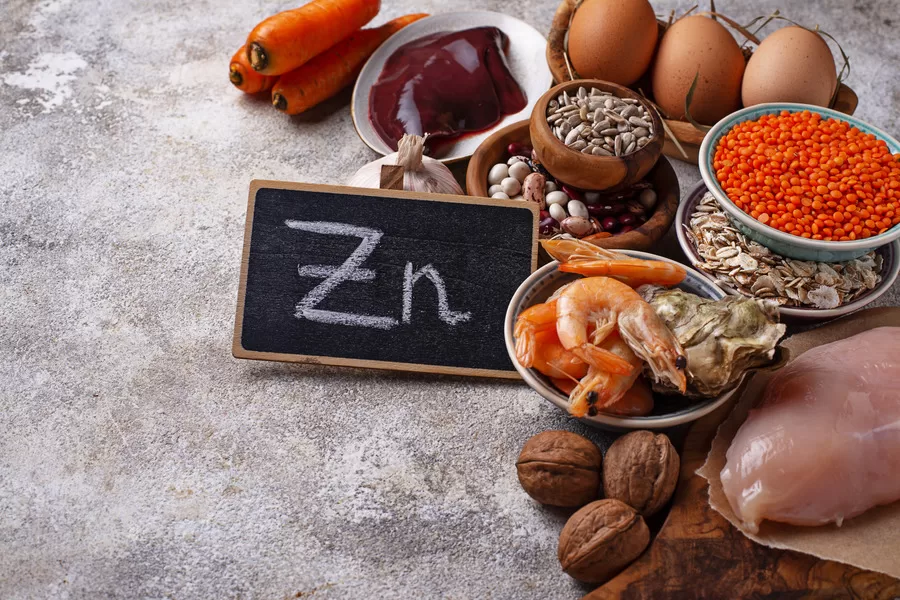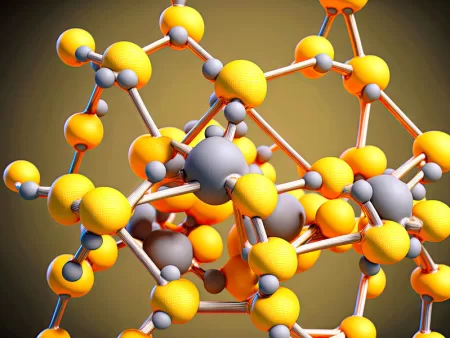
Imagine discovering a secret ingredient that could supercharge your immune system, heal your skin faster than ever, nurture your body’s growth, enhance your mental health, and protect your precious eyesight. Now, imagine that this isn’t just a figment of your imagination but a real, tangible element that you can start benefiting from today.
This element is zinc, a mighty mineral with the power to transform your health in ways you never thought possible.
Zinc
Zinc serves as a cornerstone for our immune defenses, acting as a shield that enhances the potency of frontline defenders such as neutrophils and killer cells. This essential mineral boosts the vigilance and strength of our immune response, ensuring our body’s guardians are always at their best. By supporting these cells, zinc helps maintain our health’s fortitude against invading pathogens.
The Versatile Defender
With its remarkable dual functionality, zinc stands as a versatile defender within our body. Its antioxidative and anti-inflammatory properties provide a holistic defense system, combating pathogens and soothing inflammation. Initiating zinc supplements at the early signs of a cold can dramatically diminish its impact, making it a critical ally in our health arsenal.
Navigating the Impact of Zinc Scarcity
The absence of adequate zinc is akin to venturing into a skirmish unprotected. Research underscores that a zinc shortfall weakens immune functionality, elevating infection risk and elongating illness duration. In these instances, supplementing with zinc transforms from a beneficial action to a critical necessity, akin to reinforcing your immune legion to better withstand adversary onslaughts.
In essence, zinc’s contribution to immune health cannot be overstated. It underpins the development and efficacy of key immune operatives, while also acting as a powerful antioxidant and inflammation mediator. By ensuring a diet rich in zinc or through judicious supplementation, we equip our immune system with the necessary tools to repel infectious challenges effectively. Zinc, therefore, is not just a mineral; it is the bedrock upon which our immune resilience is built.
The Healing Accelerator for Your Skin
Imagine zinc as the healing accelerator our skin desperately needs when injured. This essential mineral is akin to a construction manager, ensuring the structural integrity of our skin’s barrier. In the event of skin damage—be it scrapes, burns, or deeper wounds—zinc springs into action, facilitating rapid repair and restoration. It orchestrates the skin’s healing symphony, enhancing the production of collagen, which acts like the cement holding our skin’s framework together. This accelerated repair process not only closes wounds more swiftly but also minimizes the risk of infection and the formation of unsightly scars.
Zinc’s Multifaceted Role in Wound Recovery
Zinc’s role in wound healing is multifaceted, acting not just in tissue reconstruction but also as an immune booster and an inflammation regulator. Picture the immune system as a specialized cleanup crew; zinc ensures this team is well-equipped, enhancing their efficiency in safeguarding the wound against bacterial invaders. Simultaneously, zinc serves as a mediator, fine-tuning the body’s inflammatory response to injury. It’s essential for keeping inflammation in balance—enough to signal healing, but not so much that it delays the process or causes discomfort.
The Consequences of Zinc Deficiency on Healing
Lacking sufficient zinc can significantly slow down the healing journey, akin to a construction project stalling due to a shortage of materials. Chronic wounds, such as ulcers, can persist longer, posing a greater risk of infection and complications. This is often evidenced by lower zinc levels in individuals suffering from persistent wounds. Supplementing with zinc can provide these patients the critical support needed, jump-starting the healing process and aiding in overcoming such chronic conditions.
Supports Growth and Development
Did you know zinc is like a super helper for our bodies? It’s super important for moms who are going to have babies, little babies just starting to explore the world, and kids who are growing up fast. Zinc helps our bodies build all sorts of things from the ground up, just like building blocks. It makes sure everything grows right and stays strong, from our bones to our brains.
Why Babies and Kids Really Need Zinc
From the moment a baby starts growing in their mom’s belly, zinc is there making sure they’re getting a good start. And when they’re born, zinc keeps on helping them grow big and strong. It’s especially important when our bodies are learning to do new things, like walking or figuring out puzzles. For kids, having enough zinc means they can keep up with all the fun and learning every day brings.
What Happens When We Don’t Get Enough Zinc
Not getting enough zinc can be a bit like trying to build a tower with some blocks missing. Kids might not grow as tall as they could, or they might take longer to learn new skills. And because zinc is also like a shield against germs, not having enough can mean getting sick more often. This is why it’s super important to make sure kids get enough zinc in their food.
Getting Enough Zinc
So, how do we make sure everyone gets enough zinc? Eating foods like meats, beans, nuts, and dairy is a great start. These foods are like zinc power-ups for our bodies. Sometimes, kids might need a little extra zinc, especially if they’re not getting enough from their meals. That’s when a zinc supplement, kind of like a health bonus, can help fill in the gaps.
Zinc: The Big Helper for Making Families
How Zinc Helps Guys
For guys, zinc is really important for making healthy sperm. It’s like the secret ingredient that helps sperm grow strong and ready for their big journey. Zinc also helps make a hormone called testosterone, which is really important for guys to develop right during puberty and stay healthy. If a guy doesn’t have enough zinc, his sperm might not be as strong or as quick, which can make it tough to start a family.
Why Zinc is a Star for Women
For women, zinc is just as important. It helps with so many steps in having a baby, from the very start when an egg gets ready, all the way to the end when the baby is born. Zinc makes sure that the egg is super healthy and has the best chance of turning into a baby. It’s also important for keeping the mom healthy while she’s pregnant, which is super important for the baby too.
Not Enough Zinc? Here’s What Could Happen
If people don’t get enough zinc, it can make it harder to have a baby. Guys might find that their sperm isn’t as strong, and women might have a tougher time getting pregnant or staying healthy during pregnancy. That’s why eating foods with zinc, like meat, beans, and nuts, is really important for anyone thinking about having kids.
Zinc and Pregnancy
When a woman is pregnant, her body needs more zinc than usual. That’s because zinc is helping not just one, but two people stay healthy. It’s working overtime to make sure the baby grows right and comes into the world healthy and strong. This is why doctors sometimes suggest that pregnant women make sure they’re getting enough zinc, either from their food or from vitamins.
So, getting enough zinc is really important for anyone who wants to start a family. It helps in so many ways, from making sure sperm and eggs are healthy, to helping babies grow right in their mom’s belly. Eating foods rich in zinc or taking supplements if you need to is like giving your body the tools it needs to make a healthy, happy family.
Improves Mental Health
- Nature’s Mood Enhancer: A deficiency in this critical nutrient might be behind the gloom and despondency many experience. Its pivotal role in neurotransmitter regulation is garnering attention for its mood-boosting properties, offering a glimmer of hope for those navigating the tumultuous waters of mental health disorders.
- Quieting the Mind’s Turmoil: In the relentless grip of anxiety, this element emerges as a source of tranquility. It subtly adjusts the nervous system’s output, promoting a sense of calm and well-being that can shield against the relentless surge of stress and worry, providing a steadier mental footing.
- A Complementary Approach to Emotional Health: The exploration of this nutrient as a complementary asset in mental health treatment underscores its potential beyond mere dietary importance. Its integration into broader treatment plans signifies a holistic shift towards recognizing the multifaceted needs of mental wellness.
- Feeding the Mind, Nurturing the Soul: Our diet’s impact on mental health cannot be understated, with this essential mineral standing at the crossroads of physical and emotional well-being. Its contribution to brain health is a testament to the power of nutrition in fostering an environment conducive to emotional resilience and clarity.
- A Balanced Diet for a Balanced Mind: Embracing a diet that includes zinc-rich foods such as legumes, seeds, and whole grains can pave the way for improved mental health. For those needing a lift, supplements may offer a helping hand, illustrating the critical role of mindful nutrition in supporting our mental landscapes.
Supports Eye Health
This essential nutrient found abundantly in the retina and choroid acts as a sentinel for our eyesight. It is instrumental in keeping our vision clear and defending against conditions that blur vision or make seeing in low light difficult, such as age-related macular degeneration (AMD) and night blindness.
- The Protective Role in Our Eyes: Operating covertly, it teams up with vitamin A, transforming it into melanin within our eyes. This process is akin to equipping the internal structures of our eyes with natural sunglasses, safeguarding them against excessive light and preserving the clarity of our vision.
- Battling Eye Conditions: As a frontline defense against age-related vision issues, this mineral is invaluable. It plays a key part in mitigating the risk of diseases that obscure vision and aids in enhancing our ability to see when the light is dim, ensuring our eyes have the support they need to combat these ailments.
- The Silent Hero of Visual Health: Though its contributions often go unnoticed, this nutrient is constantly at work, facilitating swift and clear communication between our eyes and brain. This silent support system is crucial for maintaining optimal vision, allowing us to enjoy life’s visual experiences to the fullest.
- Maintaining Eye Health: To ensure our eyes are well-protected, incorporating foods rich in this mineral, such as meats, nuts, and seeds, into our diet is key. In some cases, supplementation may be necessary to meet our body’s needs, acting as a fortification for our eyes against the tests of time.
Enhancing Vision with Care
In conclusion, the role of this nutrient in eye health is profound. From shielding our eyes against degenerative conditions to preserving night vision, its importance is clear. A diet rich in these essential elements supports our visual health, allowing us to cherish every moment seen through our eyes.
Conclusion
Zinc supercharges the immune system, protecting against infections and reducing inflammation. It accelerates wound healing, playing a crucial role in skin repair and reducing the risk of infection. Essential for growth and development, zinc supports healthy pregnancies and child development. Improves mental health by regulating neurotransmitters, offering a natural mood boost and anxiety relief. Supports eye health, aiding in vision clarity and protecting against age-related vision deterioration.
FAQs
This nutrient fortifies immune cell functions, mitigates inflammation, and forms a barrier against disease-causing agents, ensuring our body’s defense mechanisms operate at peak efficiency.
Indeed, its contribution to skin restoration is profound, promoting cellular renewal, aiding in the synthesis of key structural proteins, and defending against microbial invaders.
Central to developmental processes, it supports essential biological functions including cellular proliferation, protein formation, and genetic material’s integrity, crucial from early development onwards.
By fine-tuning brain chemistry and communication pathways, it enhances emotional balance, offering a buffer against the tumult of stress and mental strain.
It assists in vital visual processes, including the maintenance of protective eye pigments and nutrient metabolism, thus guarding against degenerative eye conditions and preserving sight.







